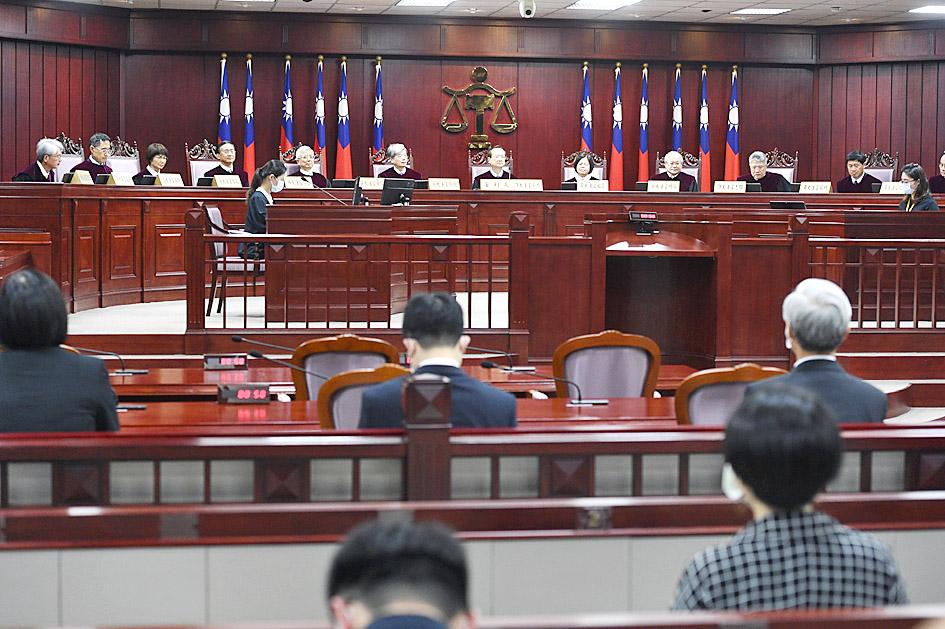Adultery was decriminalized in Taiwan yesterday after the Council of Grand Justices issued Constitutional Interpretation No. 791, declaring that Article 239 of the Criminal Code and a proviso clause for Article 239 of the Code of Criminal Procedure (刑事訴訟法) are unconstitutional and considered null and void, effective immediately.
The 15 justices issued the interpretation after hearing debate on the article, which said that both people convicted in a case of adultery face up to one year in prison, although no trial was possible without a complaint by the spouse.
The clause says that in the case of an offense specified in the Criminal Code, the withdrawal of a complaint against an accused spouse is not the same as the withdrawal of a complaint against the other party in the alleged adulterous relationship.

Photo: George Tsorng, Taipei Times
The interpretation was issued after 18 judges and a man convicted of adultery this year asked the Council of Grand Justices to overturn Interpretation No. 554, which found the Criminal Code article constitutional.
In issuing Interpretation No. 791, the council said that the Criminal Code article was a breach of sexual autonomy and the principle of proportionality, while the proviso clause violated the principle of fairness.
The Criminal Code should only be cited against acts constituting severe legal transgressions and should not be cited in cases involving marital relations, the council said.
An investigation by the state into a case of adultery, which usually occurs in private residences, could be construed as a breach of privacy, not only trampling on the core principle of sexual autonomy, but also ultimately affecting the relationship of the married couple, the grand justices said.
The Code of Criminal Procedure clause, which was put in place to encourage married couples to remain together, while still allowing proceedings against the other party to the adulterous relationship, is ineffective, as investigations sour martial relations and violate the principle of equality, the grand justices said.
Interpretation No. 791 also annuls Interpretation No. 554, they said.
The processes would begin immediately to amend the Criminal Code and the Code of Criminal Procedure, officials said.
Lawyer Huang Lu-fang (黃祿芳) said that the Criminal Code article has limited deterrent effect and abolishing the laws would not affect families.
Lawyer Cheng Yuan-hsiang (鄭遠翔) said that criminal punishment for adultery was a violation of people’s basic rights.
The article, established with the purpose of “protecting the wholesomeness of the family,” has no legitimacy nor efficacy and only becomes a weapon of revenge for the aggrieved party, Cheng said.
However, lawyer Chiu Pei-en (裘佩恩) disagreed, saying that the article was a deterrent.
With the abolition of the laws, such offenses will fall under the Civic Code, which does not offer the same deterrence that the Criminal Code does, Chiu said, adding that removing the article would lead to social chaos.
Grand Justice Wu Chen-huan (吳陳鐶) was the only justice among the 15 who opposed Interpretation No. 791.
Additional reporting by Wang Ting-chuan, Lo Chi and CNA

US President Donald Trump yesterday announced sweeping "reciprocal tariffs" on US trading partners, including a 32 percent tax on goods from Taiwan that is set to take effect on Wednesday. At a Rose Garden event, Trump declared a 10 percent baseline tax on imports from all countries, with the White House saying it would take effect on Saturday. Countries with larger trade surpluses with the US would face higher duties beginning on Wednesday, including Taiwan (32 percent), China (34 percent), Japan (24 percent), South Korea (25 percent), Vietnam (46 percent) and Thailand (36 percent). Canada and Mexico, the two largest US trading

AIR SUPPORT: The Ministry of National Defense thanked the US for the delivery, adding that it was an indicator of the White House’s commitment to the Taiwan Relations Act Deputy Minister of National Defense Po Horng-huei (柏鴻輝) and Representative to the US Alexander Yui on Friday attended a delivery ceremony for the first of Taiwan’s long-awaited 66 F-16C/D Block 70 jets at a Lockheed Martin Corp factory in Greenville, South Carolina. “We are so proud to be the global home of the F-16 and to support Taiwan’s air defense capabilities,” US Representative William Timmons wrote on X, alongside a photograph of Taiwanese and US officials at the event. The F-16C/D Block 70 jets Taiwan ordered have the same capabilities as aircraft that had been upgraded to F-16Vs. The batch of Lockheed Martin

China's military today said it began joint army, navy and rocket force exercises around Taiwan to "serve as a stern warning and powerful deterrent against Taiwanese independence," calling President William Lai (賴清德) a "parasite." The exercises come after Lai called Beijing a "foreign hostile force" last month. More than 10 Chinese military ships approached close to Taiwan's 24 nautical mile (44.4km) contiguous zone this morning and Taiwan sent its own warships to respond, two senior Taiwanese officials said. Taiwan has not yet detected any live fire by the Chinese military so far, one of the officials said. The drills took place after US Secretary

THUGGISH BEHAVIOR: Encouraging people to report independence supporters is another intimidation tactic that threatens cross-strait peace, the state department said China setting up an online system for reporting “Taiwanese independence” advocates is an “irresponsible and reprehensible” act, a US government spokesperson said on Friday. “China’s call for private individuals to report on alleged ‘persecution or suppression’ by supposed ‘Taiwan independence henchmen and accomplices’ is irresponsible and reprehensible,” an unnamed US Department of State spokesperson told the Central News Agency in an e-mail. The move is part of Beijing’s “intimidation campaign” against Taiwan and its supporters, and is “threatening free speech around the world, destabilizing the Indo-Pacific region, and deliberately eroding the cross-strait status quo,” the spokesperson said. The Chinese Communist Party’s “threats